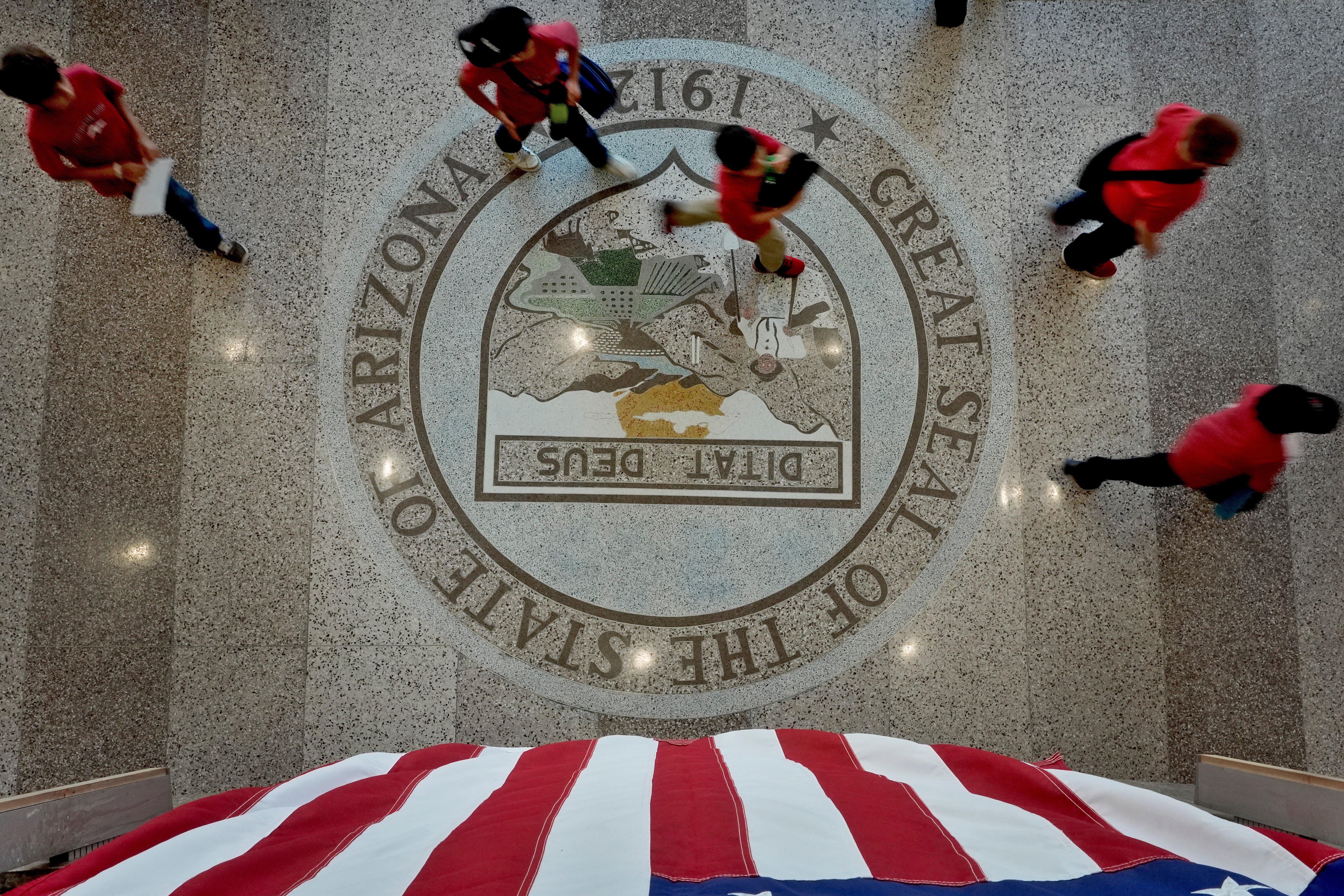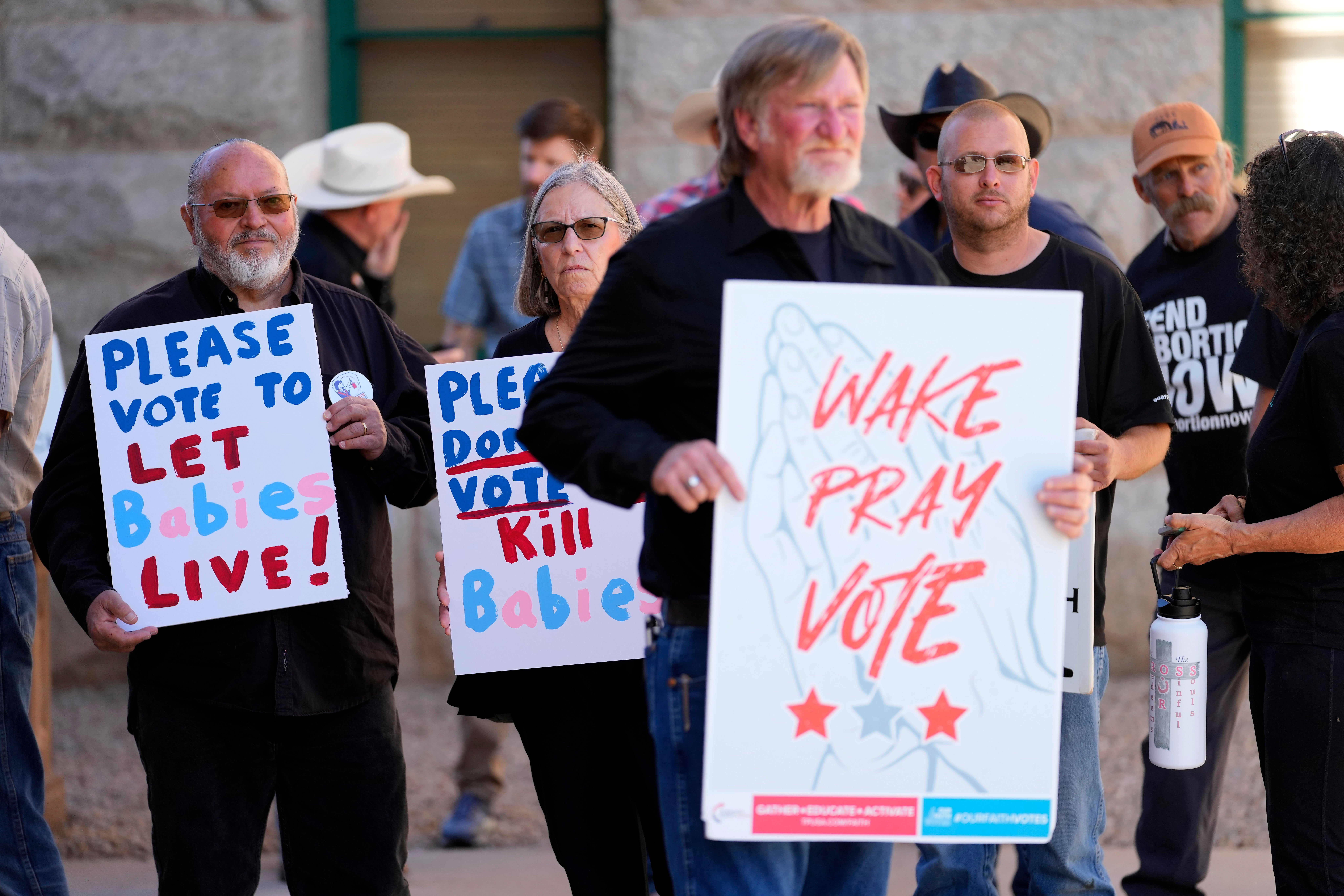Arizona legislature votes to repeal 1864 abortion ban
Repeal expected to be signed by governor won’t go into effect until 90 days after end of current legislative session
Your support helps us to tell the story
This election is still a dead heat, according to most polls. In a fight with such wafer-thin margins, we need reporters on the ground talking to the people Trump and Harris are courting. Your support allows us to keep sending journalists to the story.
The Independent is trusted by 27 million Americans from across the entire political spectrum every month. Unlike many other quality news outlets, we choose not to lock you out of our reporting and analysis with paywalls. But quality journalism must still be paid for.
Help us keep bring these critical stories to light. Your support makes all the difference.
The Arizona state senate has voted to repeal an 1864 abortion ban, and while the governor is set to sign the repeal, the near-total ban could remain in effect into the autumn.
The Civil War-era ban went into effect last month after a ruling from the state Supreme Court. The ban only allows abortions to save the life of the mother.
Two Republicans joined with the Democrats to vote for the bill repealing the ban, with the legislation passing by 16-14. The state House voted to repeal the ban last week.
A spokesperson for Governor Katie Hobbs told 12News that the bill’s signing will not take place on Wednesday. She’s expected to sign it in the coming days.
The territorial-era abortion ban was put in place during the Civil War – decades before Arizona became a state in 1912. It carries a felony punishment of two to five years behind bars for anyone conducting an abortion.
The ban will likely still go into effect in late June, according to Democratic Arizona Attorney General Kris Mayes.

After the repeal has been signed by Ms Hobbs, it won’t go into effect until 90 days after the end of the current legislative session. The session doesn’t have a specific end date, but it typically ends between late June and July, meaning that the ban could remain in effect into the autumn.
But Ms Mayes told NPR earlier this month that the ban won’t be enforced while it is in effect.
The ban went into effect for a short period after the US Supreme Court reversed Roe v Wade in the summer of 2022 before it was blocked in the courts.
On 9 April, it was brought back by the Arizona state Supreme Court in a ruling that prompted nationwide attention and rebuke from abortion rights advocates.
After the expected repeal, Arizona is set to go back to a 15-week abortion ban, with voters possibly set to vote on enshrining abortion rights in the state constitution in November, according to The Washington Post.

In October, 59 per cent of Arizonans said in a New York Times/Siena College poll that abortion should be mostly or always legal while 34 per cent said it should be mostly or always illegal.
Republicans have slim majorities in both the state House and the state Senate. They have faced increasing pressure to repeal the ban from within their own party, from figures such as former President Donald Trump and Senate candidate Kari Lake.
Many Republicans see abortion as a losing issue, as polling shows that conservatives are out of step with the US population at large. The 15-week ban was seen by some in the party as a more palatable option.
Angela Florez, the President and CEO of Planned Parenthood Advocates of Arizona, said in a statement: “With today’s long-overdue victory, lawmakers stood with the overwhelming majority of Arizonans who support abortion access.”
“Abortion is essential health care, and this Civil War-era law had no place dictating our reproductive freedom,” she said, but added that “The reality is that Arizonans will still be living under a restrictive 15-week abortion ban”.
Arizona is an important state both in the upcoming presidential race and in the race for congressional control. President Joe Biden won Arizona by less than 11,000 votes in 2020, becoming the first Democrat to win the state on the presidential level since Bill Clinton in 1996.
Subscribe to Independent Premium to bookmark this article
Want to bookmark your favourite articles and stories to read or reference later? Start your Independent Premium subscription today.

Join our commenting forum
Join thought-provoking conversations, follow other Independent readers and see their replies
Comments